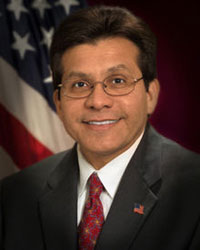Justice Department aides are key to Gonzales' credibility
Two senior Justice Department aides who orchestrated the firings of eight U.S. attorneys could hold the key to embattled U.S. Attorney General Alberto Gonzales' credibility with Congress as growing numbers of lawmakers call for his ouster.

One of the aides, Gonzales' former chief of staff Kyle Sampson, will testify Thursday in front of a Senate panel investigating whether the dismissals were politically motivated.
The other, Monica Goodling, has said she will refuse to answer questions at upcoming Senate hearings, citing her Fifth Amendment constitutional protection against self-incriminating testimony.
Both are fiercely loyal to Gonzales. And both could clarify how involved Gonzales was in planning the dismissals - a sore point for lawmakers who say they feel deceived by conflicting Justice Department statements about the purge.
"We were misled, apparently, by some ... Department of Justice officials, and we have a right as a Congress to find out exactly what happened," Sen. Lindsey Graham of South Carolina, a Republican member of the Senate Judiciary Committee, said last weekend on CBS television's "Face the Nation."
"We need to have the most important players before the Senate Judiciary Committee, under oath, with a transcript, telling the whole truth," Sen. Dick Durbin, an Illinois Democrat who is also on the Senate panel, said on NBC's "Meet the Press."
Justice Department e-mails sent to Congress show Sampson and Goodling were both closely involved for at least a year by attending meetings, sitting in on conference calls and corresponding with White House officials in drawing up the plans to fire the prosecutors with as little political fallout as possible. The documents show Sampson first addressed the issue in e-mails with the White House shortly after the 2004 presidential election.
Attorneys for both Sampson and Goodling declined to comment Tuesday.
Gonzales has largely blamed Sampson, who resigned March 12, for the botched way the firings were handled and incompletely described to Congress by top Justice officials under oath in two hearings. The attorney general says he had little direct involvement in the dismissals, and relied on Sampson to help select the targeted prosecutors and plan for their departures.
Senate Judiciary Chairman Patrick Leahy said he fears Sampson has become the administration's "fall guy."
"And yet we find so many e-mails that contradict what the attorney general has said, contradict what the deputy attorney general has said, contradict what the White House has said," Leahy said.
"Mr. Sampson is right in the middle of it," the Vermont Democrat said. "We're going to ask him under oath. ... I want them to say exactly what happened."
Sampson has made clear he has no intention of being a scapegoat.
"The fact that the White House and Justice Department had been discussingthis subject since the election was well-known to a number of other senior officials at the department, including others who were involved in preparing the department's testimony to Congress," Sampson's attorney, Brad Berenson, said in a March 16 statement.
If Congress was given misleading information, "it was not because any of these individuals deliberately withheld it from them, but rather because no one focused on it at the time," Berenson said.
Yet people who know Sampson doubt he will say anything Thursday to hurt Gonzales, for whom he worked at the White House counsel's office during President George W. Bush's first term.
"I believe, knowing Kyle, that he believes the truth will be helpful to Gonzales," said David Leitch, who worked with Sampson when Gonzales was White House counsel.
E-mails between Leitch and Sampson, in January 2005, are among the earliest documents to surface in the prosecutor purge. Leitch, in an interview, said he does not know the extent of Gonzales' role in the firings. He is now general counsel at Ford Motor Co.
Congress may never hear Goodling's version of how the firings unfolded. Her decision to take the Fifth Amendment is highly unusual for a current administration official - and puts Gonzales in the awkward position of reneging on his pledge to make Justice Department employees available for questioning under oath.
In Chicago Tuesday, Gonzales said he would not comment "on the decision by an employee of the department to exercise her constitutional rights."
Goodling's attorney, John Dowd, said her refusal to testify was partly the result of remarks by an unnamed senior Justice official who told an unnamed senator on the Judiciary Committee that "our client and others did not inform him of certain pertinent facts." Dowd called the congressional investigation a perjury trap.
Goodling is on a voluntary leave of absence from the Justice Department as a result of the controversy. As the department's liaison to the White House, her testimony could reveal the extent politics played in thefirings.
Her mother, Cindy Fitt of Osceola Mills, Pennsylvania, said Goodling is not talking even to her family about her role.
"She hasn't really done anything," Fitt said Tuesday. "But she is not talking to me about it, needless to say."
Lawrence Barcella, a former assistant U.S. attorney in Washington in the 1970s and 1980s, said the evidence to surface so far regarding the firings shows "that everybody has lousy and conflicting recollections."
"The best it ends up at the end of the day is that this attorney general and his Justice Department will look bad," said Barcella, now a white-collar criminal defense attorney.
And the worst? "That someone's testimony is taken to be so incredible that there's a referral for a criminal investigation," Barcella said.
Subscribe to Pravda.Ru Telegram channel, Facebook, RSS!


